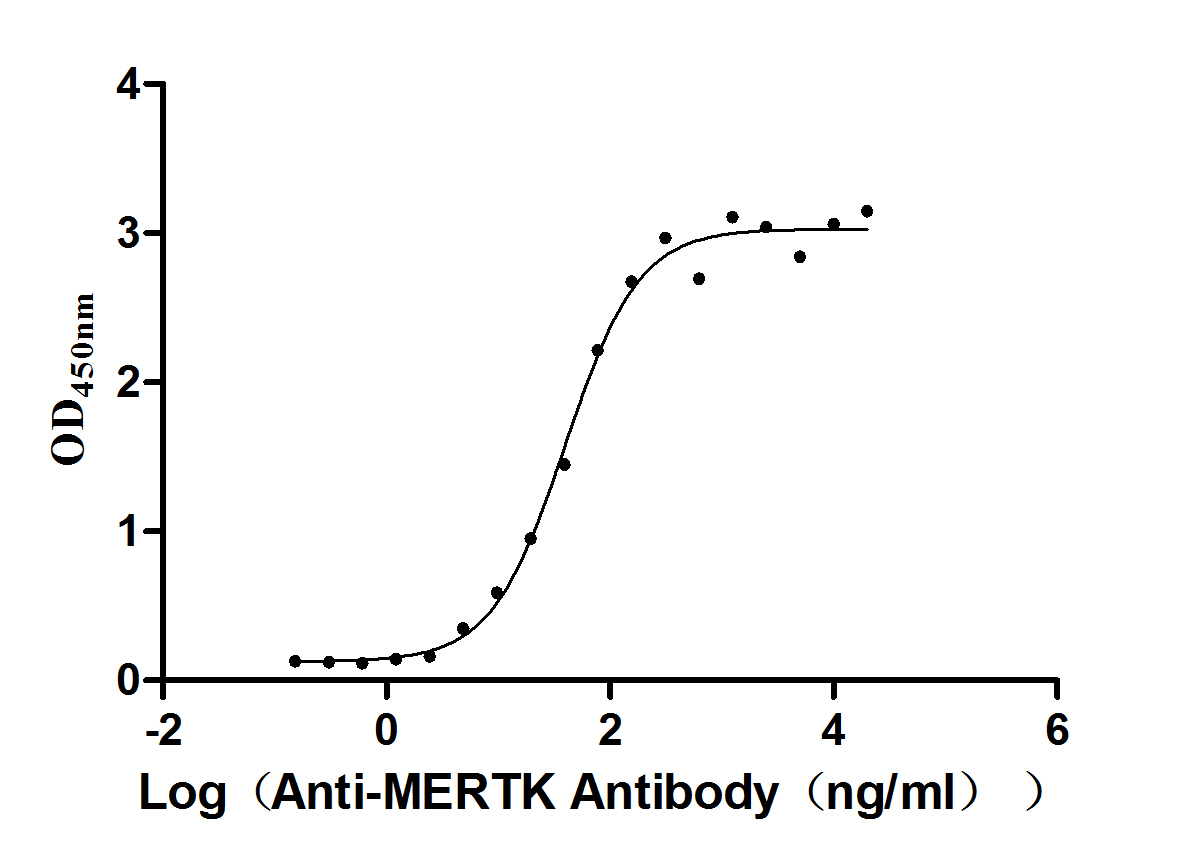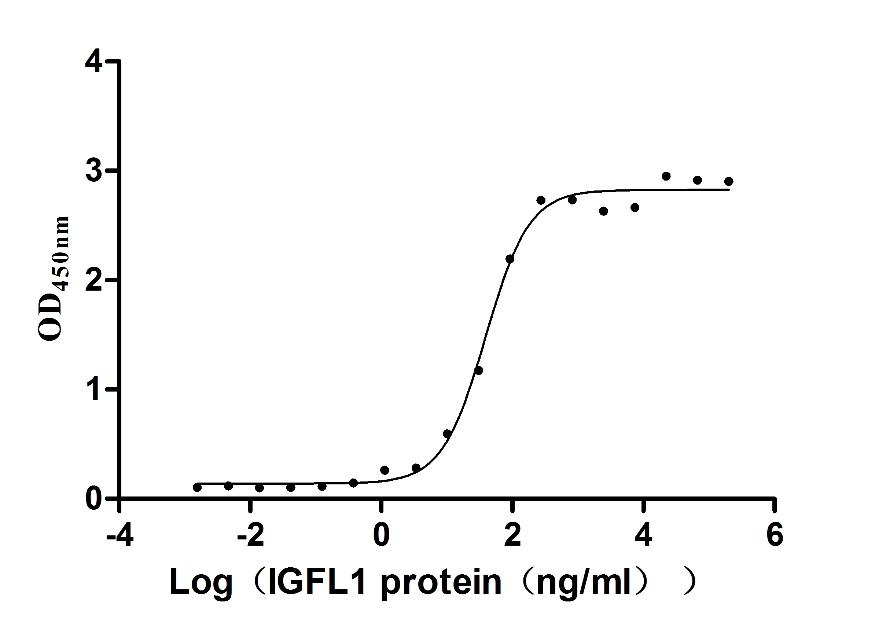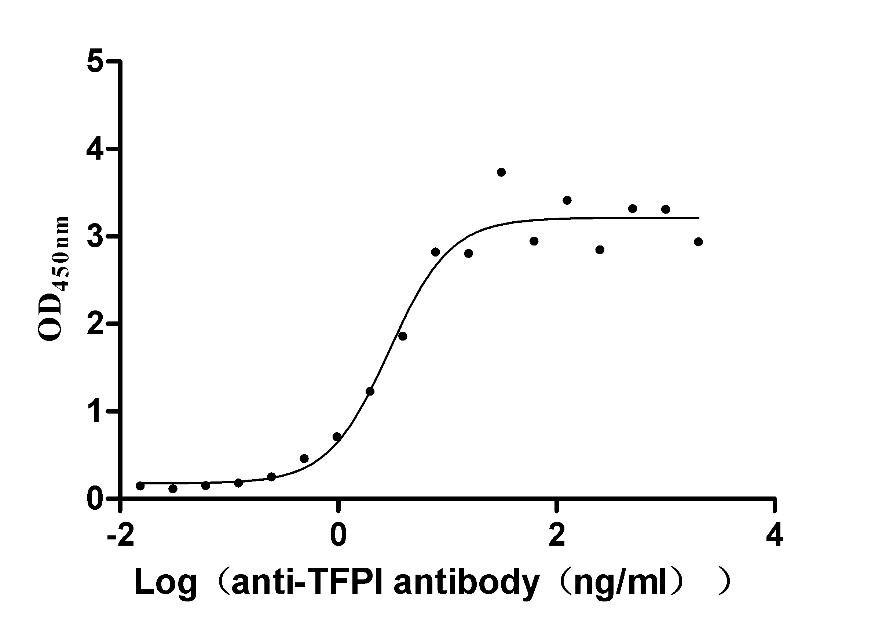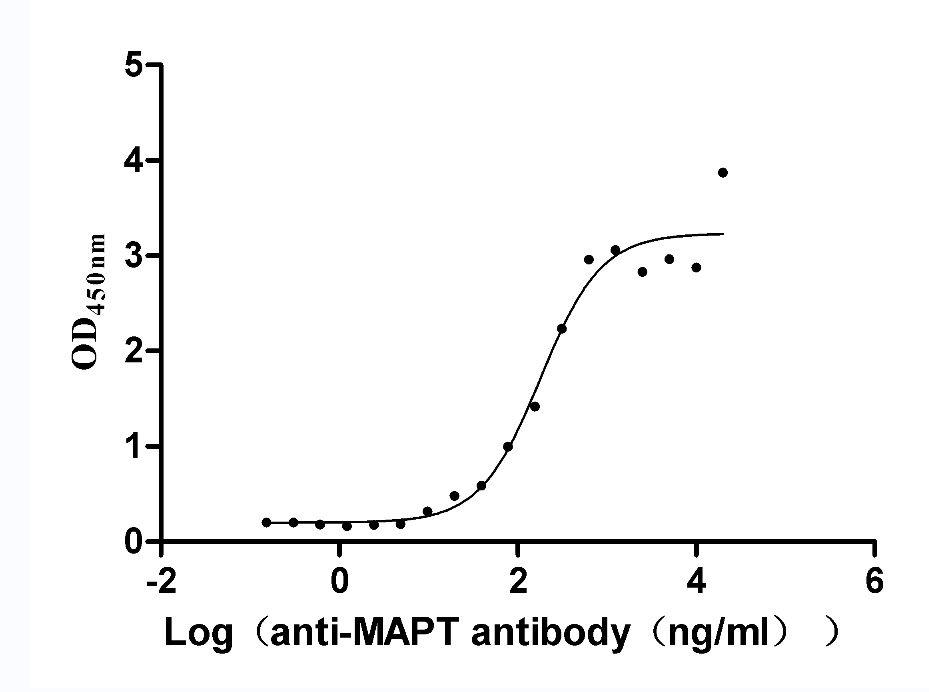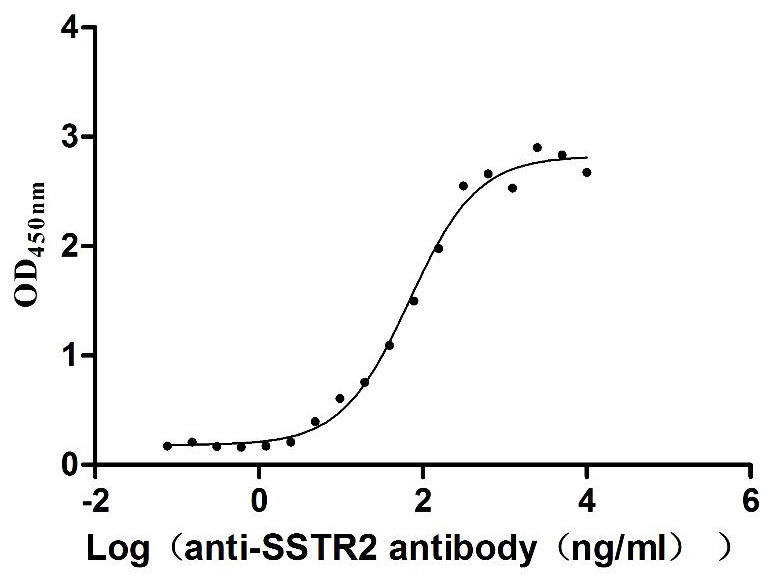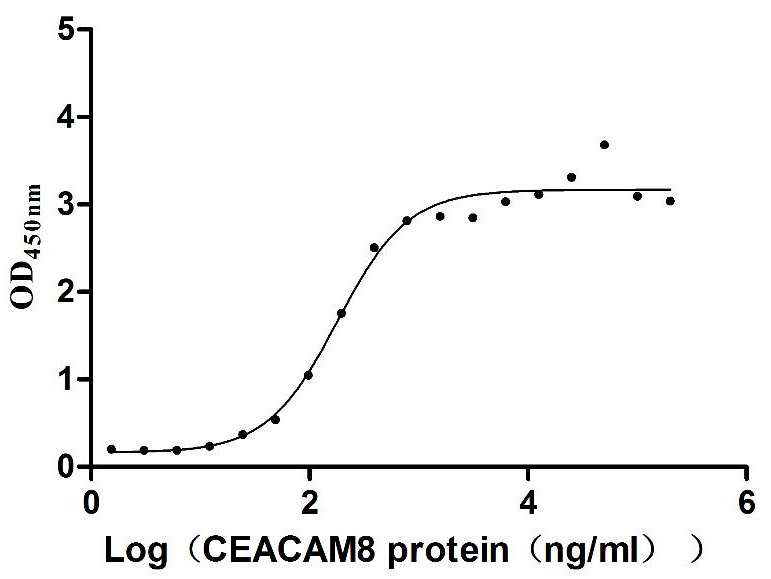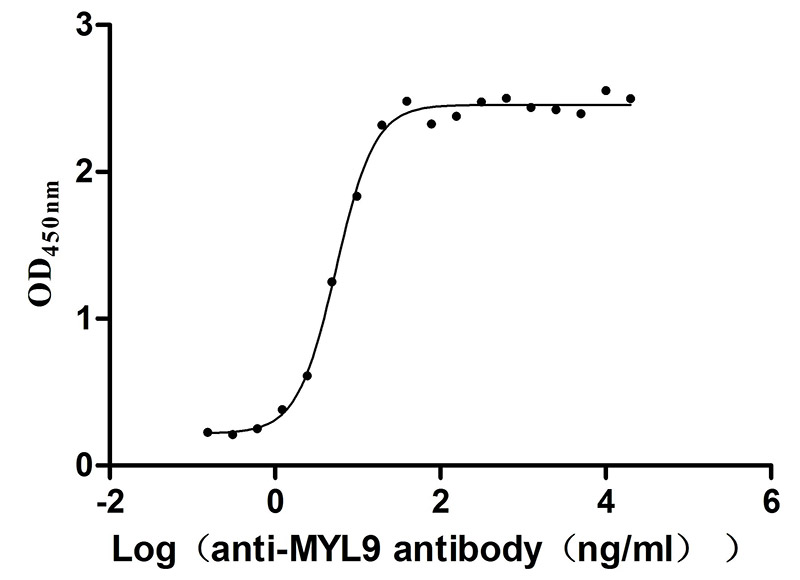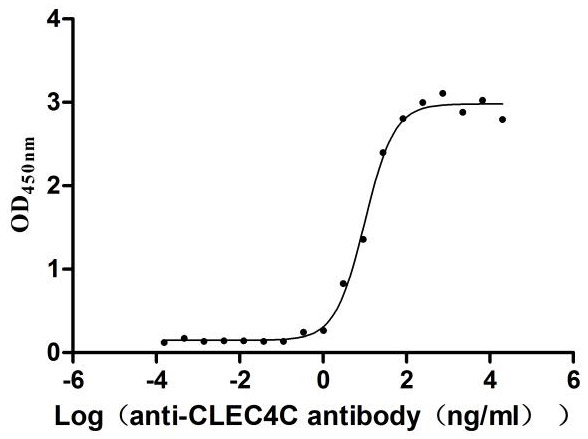Recombinant Human Ganglioside-induced differentiation-associated protein 1 (GDAP1), partial
-
货号:CSB-YP009338HU1
-
规格:
-
来源:Yeast
-
其他:
-
货号:CSB-EP009338HU1
-
规格:
-
来源:E.coli
-
其他:
-
货号:CSB-EP009338HU1-B
-
规格:
-
来源:E.coli
-
共轭:Avi-tag Biotinylated
E. coli biotin ligase (BirA) is highly specific in covalently attaching biotin to the 15 amino acid AviTag peptide. This recombinant protein was biotinylated in vivo by AviTag-BirA technology, which method is BriA catalyzes amide linkage between the biotin and the specific lysine of the AviTag.
-
其他:
-
货号:CSB-BP009338HU1
-
规格:
-
来源:Baculovirus
-
其他:
-
货号:CSB-MP009338HU1
-
规格:
-
来源:Mammalian cell
-
其他:
产品详情
-
纯度:>85% (SDS-PAGE)
-
基因名:GDAP1
-
Uniprot No.:
-
别名:GDAP1; Ganglioside-induced differentiation-associated protein 1; GDAP1
-
种属:Homo sapiens (Human)
-
蛋白长度:Partial
-
蛋白标签:Tag type will be determined during the manufacturing process.
The tag type will be determined during production process. If you have specified tag type, please tell us and we will develop the specified tag preferentially. -
产品提供形式:Lyophilized powder
Note: We will preferentially ship the format that we have in stock, however, if you have any special requirement for the format, please remark your requirement when placing the order, we will prepare according to your demand. -
复溶:We recommend that this vial be briefly centrifuged prior to opening to bring the contents to the bottom. Please reconstitute protein in deionized sterile water to a concentration of 0.1-1.0 mg/mL.We recommend to add 5-50% of glycerol (final concentration) and aliquot for long-term storage at -20℃/-80℃. Our default final concentration of glycerol is 50%. Customers could use it as reference.
-
储存条件:Store at -20°C/-80°C upon receipt, aliquoting is necessary for mutiple use. Avoid repeated freeze-thaw cycles.
-
保质期:The shelf life is related to many factors, storage state, buffer ingredients, storage temperature and the stability of the protein itself.
Generally, the shelf life of liquid form is 6 months at -20°C/-80°C. The shelf life of lyophilized form is 12 months at -20°C/-80°C. -
货期:Delivery time may differ from different purchasing way or location, please kindly consult your local distributors for specific delivery time.Note: All of our proteins are default shipped with normal blue ice packs, if you request to ship with dry ice, please communicate with us in advance and extra fees will be charged.
-
注意事项:Repeated freezing and thawing is not recommended. Store working aliquots at 4°C for up to one week.
-
Datasheet :Please contact us to get it.
相关产品
靶点详情
-
功能:Regulates the mitochondrial network by promoting mitochondrial fission.
-
基因功能参考文献:
- This study showed that the characterization of GDAP1associated Charcot-Marie-Tooth disease. PMID: 29694336
- Study expands the mutational spectrum of GDAP1-related Charcot-Marie-Tooth (CMT) disease with the identification of new and unreported GDAP1 variants and demonstrates the predominance of the axonal form of neuropathy in CMT disease associated with GDAP1; highlights the clinical characteristics associated with these genotypes and describe the relative frequency of GDAP1 variants amongst the Chinese population. PMID: 29372391
- Study shows that GDAP1 is indeed a GST enzyme, and demonstrates a specific GSH-conjugating activity in vitro which seems to be regulated by the hydrophobic domain 1 (HD1) exerting an autoinhibitory function. HD1 could adopt an amphipathic pattern necessary to induce remodeling of organelles-mimicking liposomes by Gdap1. PMID: 27841286
- We identified GDAP1 variants in approximately 1% of our cohort with IPNs, and established a founder mutation in half of these patients. Our study originally described the mutational spectrum and clinical features of GDAP1-related CMT patients in Japan. PMID: 28244113
- This study report an AD-CMT2K with large phenotypic variability due to a novel dominant GDAP1 variant. PMID: 28236508
- GDAP1 hypomethylation can serve as a biomarker for alcohol dependence severity and treatment outcome. PMID: 27128683
- This study suggest GDAP1 as the first gene that should be analysed in Italian patients affected by CMT2. PMID: 26525999
- study reports on 2 Charcot-Marie-Tooth (CMT) families in which a newly identified Glu222Lys mutation within the GDAP1 gene segregates both in autosomal dominant and recessive traits PMID: 25337607
- The novelty of our data is the relatively high frequency of SH3TC2 and GDAP1 mutations in demyelinating and axonal forms, respectively, of Charcot-Marie-Tooth disease PMID: 25429913
- Results show that JPH1 and GDAP1 share a common pathway and depend on each other; therefore, JPH1 can contribute to the phenotypical consequences of GDAP1 mutations. PMID: 25168384
- GDAP1-associated polyneuropathy caused predominantly a mild and slowly progressive phenotype. PMID: 23456260
- This studies suggest that the pathophysiology of GDAP1-related CMT neuropathies may be associated with abnormal distribution and movement of mitochondria throughout cytoskeleton towards the ER and subplasmalemmal microdomains. PMID: 23542510
- GDAP1 regulates mitochondrial and peroxisomal fission by a similar mechanism. PMID: 23628762
- A novel heterozygous missense mutation (Arg120Gly) in the GDAP1 gene co-segregates with the disease within the pedigree of an Italian Charcot-Marie-Tooth disease type 2 (CMT2) family. PMID: 22971097
- This study suggested that the mutation of GDAP1 cased onion bulb-like formations of schwann cell in peripheral neuropathies. PMID: 23147504
- A French family with Charcot-Marie-Tooth disease is related to simultaneous heterozygous MFN2 and GDAP1 mutations. PMID: 22546700
- Patients of type 4 Charcot-Marie-Tooth disease showed reduced GDAP1 levels, GHS concentration and mitochondrial membrane potential. PMID: 21965300
- Charcot-Marie-Tooth-related gene GDAP1 complements cell cycle delay at G2/M phase in Saccharomyces cerevisiae fis1 gene-defective cells PMID: 21890626
- we report two recessive intermediate Charcot-Marie-Tooth (RI-CMT) patients with GDAP1 missense mutations PMID: 21692914
- We show that patients with dominant GDAP1 mutations may display clear axonal Charcot-Marie-Tooth disease PMID: 21753178
- Clinical outcome of Charcot-Marie-Tooth disease caused by mutations in the GDAP1 gene cannot be predicted solely on the basis of genetic results (missense/nonsense mutations). PMID: 21365284
- An p.R120W mutation has been identified in GDAP1 causing autosomal dominant Charcot-Marie-Tooth disease with a wide clinical profile. PMID: 21199105
- This review provide that Mitochondrial dysfunction and pathophysiology of Charcot-Marie-Tooth disease involving GDAP1 mutations. PMID: 20849849
- A mutations frquency of 27% in the GST domain of GDAP1 in the dominant form of axonal Charcot Marie Tooth type 2K was observed. PMID: 20685671
- Charcot-Marie-Tooth type 4C4 (CMT4C4) phenotype associated with the third recurrent GDAP1 mutation having a common origin in European population was characterized. PMID: 20232219
- different cellular mechanisms that disturb mitochondrial dynamics underlie the similar clinical manifestations caused by GDAP1 mutations, depending on the mode of inheritance PMID: 19782751
- GDAP1 is broadly expressed in cancer cell lines of different tissue origin. There is a consensus YY1 binding site in the GDAP1 core promoter. PMID: 19720140
- Mutations in GDAP1 are a frequent cause of autosomal recessive demyelinating Charcot-Marie-Tooth disease type 4A PMID: 12499475
- This study shows the variability of the phenotype associated with mutations in GDAP1 gene in terms of associated signs and severity of Charcot-Marie-Tooth disease. PMID: 12868504
- This study detected six distinct mutant alleles in four families, four of which are novel. PMID: 14561495
- Genetic analysis revealed a homozygous thymidine deletion at nucleotide position 558 resulting in a frameshift at codon 186 and a stop codon at position 205. PMID: 15019704
- may be related to the maintenance of the mitochondrial network PMID: 15772096
- In this study we report a novel mutation Met116Thr in the GDAP1 gene identified in a three generation Polish family with axonal CMT4. PMID: 16343542
- The patient of Charcot-Marie-Tooth with pyramidal feature has GDAP1 mutation(M116R). PMID: 16607474
- Like other cytosolic GSTs, GDAP1 protein has a dimeric structure. deletion of C-terminal transmembrane domain allowed preparation of soluble protein. purified protein was assayed for glutathione-dependent activity against a library of GST substrates. PMID: 16857173
- Two different point mutations, a novel R191X nonsense and a L239F missense mutation were detected in the GDAP1 gene causing Charcot-Marie-Tooth neurpathy. PMID: 17433678
- A novel C233T transversion at codon 78 (P78L) was detected in 6 patients from 3 unrelated families. PMID: 18062449
- A novel GDAP1 Q218E mutation in autosomal dominant Charcot-Marie-Tooth disease. PMID: 18231710
- A novel Pro153Leu mutation in the GDAP1 gene identified in a consanguineous Polish family as cause of Charcot-Marie-Tooth disease type 4C4. PMID: 18421898
- a novel GDAP1 mutation in an Old Order Amish family with autosomal recessive Charcot-Marie-Tooth disease. PMID: 18492089
- Data show that the mutations in the GDAP1 gene are a common cause of early-onset Autosomal recessive Charcot-Marie-Tooth syndrome (AR-CMT). PMID: 18504680
- clinical, electrophysiologic & genetic study of 2 patients with missense GDAP1 mutations with severe neuropathy; 1 mutation (Tyr279Cys) has not been reported before; despite similitude of mutations & electromyography, clinical course was different PMID: 18991200
- Data suggest that besides the regulatory role GDAP1 plays in mitochondrial network dynamics, it may also be involved in energy production and in the control of mitochondrial volume. PMID: 19089472
- this GDAP1 region contains critical overlapping motifs defining intracellular targeting by the tail anchor domain concomitant with functional aspects PMID: 19340293
- Data report a novel missense mutation and two polymorphisms in the ganglioside-induced differentiation-associated protein 1 gene identified in a five generation Turkish family with autosomal recessive Charcot-Marie-Tooth type 2. PMID: 19381883
- GDAP1 mutations should be considered both in recessive and sporadic cases of early-onset axonal Charcot-Marie-Tooth disease PMID: 19500985
- Thirty sequence variants have been found in the analysed genes from patients with Charcot-Marie-Tooth disorders: 5 pathogenic mutations in the GDAP1 gene and 2 pathogenic mutations in the PRX gene. PMID: 19837996
显示更多
收起更多
-
相关疾病:Charcot-Marie-Tooth disease 4A (CMT4A); Charcot-Marie-Tooth disease, axonal, with vocal cord paresis, autosomal recessive (CMT2RV); Charcot-Marie-Tooth disease 2K (CMT2K); Charcot-Marie-Tooth disease, recessive, intermediate type, A (CMTRIA)
-
亚细胞定位:Mitochondrion outer membrane; Multi-pass membrane protein. Cytoplasm.
-
蛋白家族:GST superfamily
-
组织特异性:Highly expressed in whole brain and spinal cord. Predominant expression in central tissues of the nervous system not only in neurons but also in Schwann cells.
-
数据库链接:
HGNC: 15968
OMIM: 214400
KEGG: hsa:54332
STRING: 9606.ENSP00000220822
UniGene: Hs.168950
Most popular with customers
-
Recombinant Human Tyrosine-protein kinase Mer (MERTK), partial (Active)
Express system: Mammalian cell
Species: Homo sapiens (Human)
-
Recombinant Human Insulin growth factor-like family member 1 (IGFL1) (Active)
Express system: Mammalian cell
Species: Homo sapiens (Human)
-
Recombinant Rabbit Tissue factor pathway inhibitor (TFPI) (Active)
Express system: Mammalian cell
Species: Oryctolagus cuniculus (Rabbit)
-
Recombinant Rat Microtubule-associated protein tau (Mapt) (Active)
Express system: Mammalian cell
Species: Rattus norvegicus (Rat)
-
Recombinant Human Somatostatin receptor type 2 (SSTR2)-VLPs (Active)
Express system: Mammalian cell
Species: Homo sapiens (Human)
-
Recombinant Human Carcinoembryonic antigen-related cell adhesion molecule 6 (CEACAM6) (Active)
Express system: Mammalian cell
Species: Homo sapiens (Human)
-
Recombinant Human Myosin regulatory light polypeptide 9 (MYL9) (Active)
Express system: Yeast
Species: Homo sapiens (Human)
-
Recombinant Human C-type lectin domain family 4 member C (CLEC4C), partial (Active)
Express system: Mammalian cell
Species: Homo sapiens (Human)


